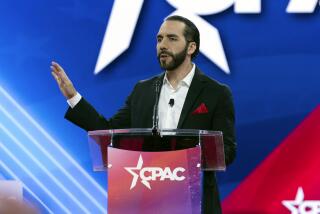Nasty turn in El Salvador
Though tame perhaps by today’s standards, El Salvador’s civil war in the 1980s was a brutal front in the Cold War that claimed 75,000 lives. The country was a frightening place where right-wing hit men assassinated the archbishop of San Salvador as he celebrated Mass, executed six Jesuit priests in the night and murdered American churchwomen by the side of a highway.
The war ended in 1992 with a peace agreement that allowed leftist guerrillas to trade their guns for participation in a political system long monopolized by wealthy landowners and the military. The ex-rebels’ Farabundo Marti National Liberation Front, or FMLN party, has won many legislative and mayoral seats since then, and Sunday’s national election offers it the first real chance to end two decades of rule by the National Republican Alliance, or Arena party.
One reason for the FMLN’s lead in the polls is that, for the first time, its presidential candidate is not a former guerrilla or identified with the war. Rather, he is a popular former television journalist, Mauricio Funes, who presents himself as a left-of-center moderate in much the same style as Barack Obama. Arena’s candidate is a U.S.-trained former police chief, Rodrigo Avila, who has sought to overcome public discontent with the incumbent administration.
The election presents an opportunity for a democratic transfer of power between political parties, but unfortunately the campaign has exposed the deep political and economic divide that fueled the civil war and persists today. The rhetoric has been marked by fiery anti-communism and fear-mongering from the right, reminiscent of the war years, when the U.S. backed government forces and the Marxist-led FMLN looked to Cuba for support. The other side counters that Arena has engaged in crony capitalism with policies that serve the rich.
The right has advertised heavily in the media -- largely sympathetic, as they were during the war -- branding Funes as a front for his vice presidential candidate, who is a former commander, and FMLN radicals who they say will move the country into the camp of Venezuelan President Hugo Chavez. It charges that the FMLN will make El Salvador an enemy of the United States, and quotes Republican congressmen threatening the legal status of more than 2 million Salvadorans who live in the U.S. and send home nearly $3 billion each year -- about 17% of El Salvador’s gross domestic product.
Funes, who has tried to stay above the fray, says his politics are more akin to those of Brazilian President Luiz Inacio Lula da Silva than to Chavez. He hopes to appeal to the vast majority of poor Salvadorans who believe their lives have not improved economically since the war nor benefited from the Central American Free Trade Agreement with the United States. He blames the government for failing to control crime by murderous street gangs. But the attacks on Funes have aroused fears and cut into a double-digit lead, and his supporters now are warning of fraud by an electoral commission controlled by Arena and its allies.
It is regrettable that the campaign turned nasty. We would urge both sides to work hard for a peaceful election Sunday and a free and fair vote count afterward. It is vital to the future of the country that both sides respect the outcome. If the FMLN wins, Arena must hand over the reins of power peacefully. And if Arena wins once again without fraud, the FMLN must swallow the bitter pill and refrain from violence.
More to Read
A cure for the common opinion
Get thought-provoking perspectives with our weekly newsletter.
You may occasionally receive promotional content from the Los Angeles Times.





